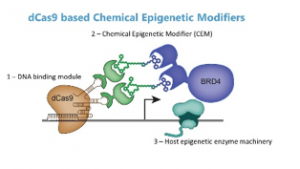Nathaniel Hathaway, Ph.D., a researcher at the UNC Eshelman School of Pharmacy’s Division of Chemical Biology and Medicinal Chemistry, Center for Integrative Chemical Biology and Drug Discovery and the Lineberger Comprehensive Cancer Center, was published in Nature Biotechnology earlier this month for his work creating tools that can control gene expression.
Hathaway, who will be promoted to associate professor Dec. 1, focuses on understanding the mechanisms of gene regulation by chromatin while discovering small molecules that change epigenetic pathways. The Nature Biotechnology publication was a collaboration with other researchers from UNC, a group at Mount Sinai Center for Therapeutics Discovery lead by Dr. Jian Jin, and the Khan research group at National Institutes of Health’s National Cancer Institute.
This latest research, titled “Dose-dependent activation of gene expression is achieved using CRISPR and small molecules that recruit endogenous chromatin machinery,” focused on building a mechanism that could cause dose-dependent gene activation using a combination of protein bioengineering and bifunctional small molecules. The Nature Biotechnology paper is centered around the CRISPR-Cas9 complex, a technology that is used to target different genes by editing the genetic sequence. However, their team used a variant of this technology that does not edit DNA and instead is capable of manipulating the epigenome. There aren’t as many tools that currently focused on dose-dependent gene targeting using proteins that are already expressed in the cell.
“What we wanted to do is invent a technology where we could take broadly active inhibitors and repurpose these chemicals focus chromatin regulatory activity to individual genes,” Hathaway said.
Hathaway’s team worked with chemical epigenetic modifiers, which bind to the deactivated Cas9 module while also interacting with molecules involved with epigenetic processes.

Hathaway said the Eshelman Institute for Innovation helped make this project a reality, especially in the early stages. He also said this work had implications in the greater field of epigenetics, or the impacts of gene expression and modification on living things. Multiple cancers and neurological disorders are driven by disruptions in the pathways that control gene expression, so this work has various applications in the field.
In the future, Hathaway wants to improve the method they use to engage target genes, and also to explore new chemistries capable of engaging the dozens of other chromatin regulatory pathways where good inhibitors exist that can be exploited by this approach.

